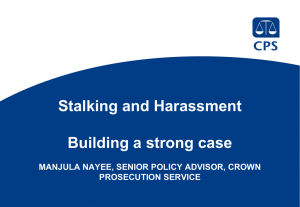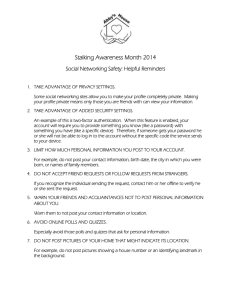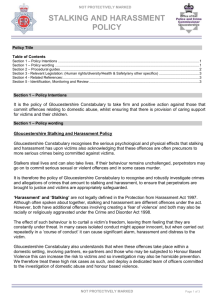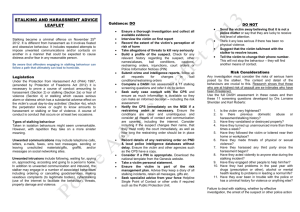Stalking Report - The Law Reform Commission of Hong Kong
advertisement
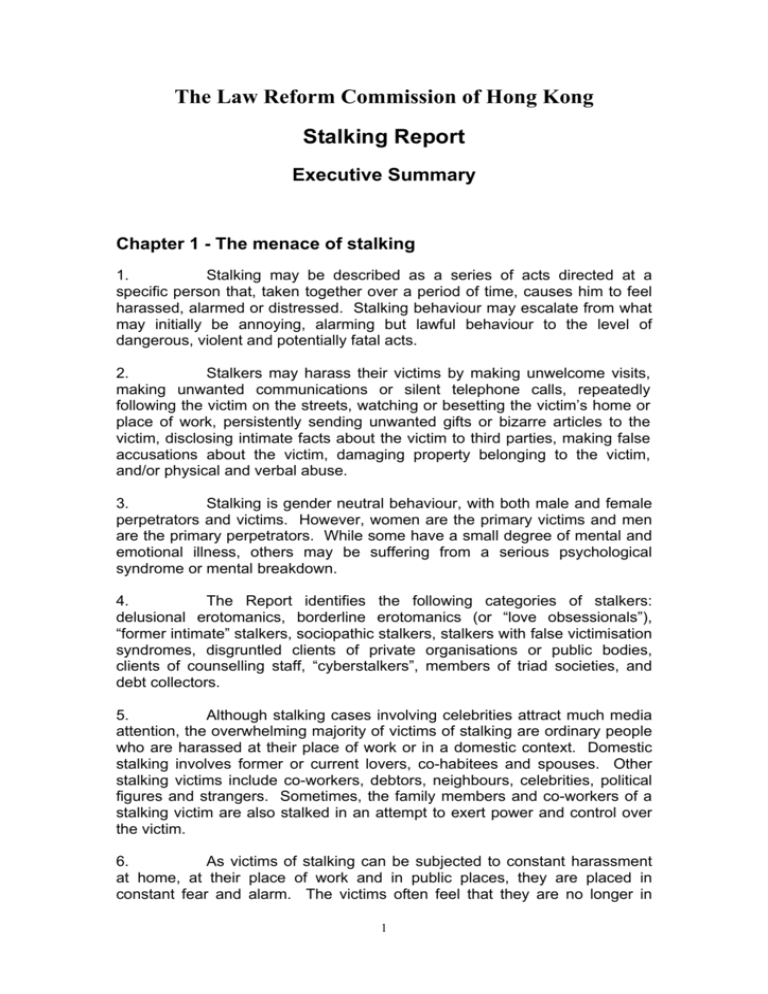
The Law Reform Commission of Hong Kong Stalking Report Executive Summary Chapter 1 - The menace of stalking 1. Stalking may be described as a series of acts directed at a specific person that, taken together over a period of time, causes him to feel harassed, alarmed or distressed. Stalking behaviour may escalate from what may initially be annoying, alarming but lawful behaviour to the level of dangerous, violent and potentially fatal acts. 2. Stalkers may harass their victims by making unwelcome visits, making unwanted communications or silent telephone calls, repeatedly following the victim on the streets, watching or besetting the victim’s home or place of work, persistently sending unwanted gifts or bizarre articles to the victim, disclosing intimate facts about the victim to third parties, making false accusations about the victim, damaging property belonging to the victim, and/or physical and verbal abuse. 3. Stalking is gender neutral behaviour, with both male and female perpetrators and victims. However, women are the primary victims and men are the primary perpetrators. While some have a small degree of mental and emotional illness, others may be suffering from a serious psychological syndrome or mental breakdown. 4. The Report identifies the following categories of stalkers: delusional erotomanics, borderline erotomanics (or “love obsessionals”), “former intimate” stalkers, sociopathic stalkers, stalkers with false victimisation syndromes, disgruntled clients of private organisations or public bodies, clients of counselling staff, “cyberstalkers”, members of triad societies, and debt collectors. 5. Although stalking cases involving celebrities attract much media attention, the overwhelming majority of victims of stalking are ordinary people who are harassed at their place of work or in a domestic context. Domestic stalking involves former or current lovers, co-habitees and spouses. Other stalking victims include co-workers, debtors, neighbours, celebrities, political figures and strangers. Sometimes, the family members and co-workers of a stalking victim are also stalked in an attempt to exert power and control over the victim. 6. As victims of stalking can be subjected to constant harassment at home, at their place of work and in public places, they are placed in constant fear and alarm. The victims often feel that they are no longer in 1 control of their lives. Some would forever be looking over their shoulder and would never be able to trust anyone again. In an attempt to avoid the stalker and to find safety, many victims are forced to change their lifestyles. They may change their telephone number, move to another district, quit their job or even refuse to go outside. As the effects of the stalking experience are substantial and may last for many years, the law should afford protection to individuals who are harassed by stalkers. Chapter 2 - Overview of responses to the Consultation Paper 7. The Privacy sub-committee received a total of 54 submissions on the Consultation Paper published in 1998. The following organisations support the proposals of the sub-committee in principle: the Hong Kong Bar Association, the Criminal Law and Procedure Committee of the Law Society of Hong Kong, the Hong Kong Young Legal Professionals Association, the Hong Kong Federation of Women Lawyers, the Prosecutions Division and the Civil Division of the Department of Justice, the Hong Kong Police Force, Security Bureau, Social Welfare Department, the Working Group on Battered Spouses, the Office of the Ombudsman, Hong Kong Family Welfare Society, Harmony House, Safetalk Domestic Violence Support Group, the member agencies of the Hong Kong Council of Social Service, the Hong Kong Federation of Women, Zonta Club of Victoria, Association for the Advancement of Feminism, Anti-Sexual Harassment Alliance, and Lingnan College. 8. The following organisations support the proposals with qualifications: Legal Aid Department, Hong Kong News Executives’ Association, Hong Kong Press Photographers Association, Asia Television Ltd, Hong Kong Commercial Broadcasting Co Ltd, Metro Broadcast Corporation Ltd and Hong Kong Human Rights Commission. The Hong Kong Journalists Association has “strong reservations” about the proposals. The Hong Kong section of the International Commission of Jurists (JUSTICE) is the only respondent who expressly objects to the introduction of anti-stalking legislation. Chapter 3 - Incidence of stalking in Hong Kong 9. Paragraph 3.9 lists the stalking-related incidents in Hong Kong. We are satisfied that stalking is a problem in Hong Kong that needs to be addressed. Even if stalking does not affect a significant number of people in Hong Kong, it is clearly a serious problem for those affected by such conduct. Chapter 4 - Protection under existing law 10. We examine in this chapter the extent to which victims of stalking can be protected from harassment under existing law. We begin with a description of the scope of remedies available under the civil law. This is followed by a discussion of the level of protection afforded by the criminal law. 2 11. Domestic Violence Ordinance - Pursuant to the Domestic Violence Ordinance, the District Court may grant a non-molestation or exclusion order not only between spouses but also between a man and woman who are cohabiting with each other. However, victims of stalking who have never cohabited or have ceased to cohabit with the stalker when harassment occurs cannot invoke the jurisdiction of the Court. Furthermore, harassment can occur in other types of domestic relationship. For instance, an elderly member of a family may be abused by those with whom he is living; parents may be abused by their violent child; and a gay or lesbian partner may become irrational or obsessive. 12. We recommend that the Administration should give consideration to reforming the law relating to domestic violence. (Recommendation 1) 13. Inadequacy of existing civil law - Although the law of torts provides a remedy to victims of stalking in some instances, the protection is neither complete nor adequate. Protection under the law of torts is “fragmented, ad hoc and piecemeal”. Despite the attempts that have been made by the courts to stretch the law of torts to provide a remedy for victims of stalking, none of the torts captures the full extent and degree of a stalker’s behaviour. 14. Where the victim does not know his stalker, he might have to retain a private investigator in order to find out where the stalker lived so that a writ could be served on him. Even if the stalker is known to the victim, many victims are discouraged from seeking a civil remedy because civil procedures are cumbersome, expensive and less appropriate where emergency protection is required. 15. Inadequacy of existing criminal law - Although existing criminal laws cover some aspects of stalking behaviour, they do not address stalking as an independent phenomenon. They treat stalking behaviour piecemeal and deal with it as isolated incidents. The stalker can be prosecuted only if his act falls within the scope of a criminal offence. But stalking can occur without breach of the peace or threats of violence. A stalker can harm his victim by simply observing him or following him about without making any threat. Existing law is inadequate in dealing with stalkers who harass their victims by following, fax, voice-mail, e-mail and/or on the Internet. 16. Conclusion - We think that stalking is a menace to society which ought to be taken seriously by the public and police. While some of the offensive behaviour associated with stalking can be dealt with under existing laws, the protection afforded by the civil and criminal law is spotty, uncertain and ineffective. Existing criminal law deals mainly with single incidents of criminal behaviour such as murder, robbery, theft and assault. It is far less developed in dealing with behaviour such as stalking which is continuous and where the whole is worse than the sum of the parts or any individual part. 3 Chapter 5 - Legislation in other jurisdictions 17. We examine in this chapter the position in other common law jurisdictions. It will be seen that all the major common law jurisdictions, including Australia, Canada, England, Ireland, New Zealand and all the states in the United States, have enacted anti-harassment or anti-stalking legislation. Chapter 6 - The new offence 18. Need for criminal sanctions - In our view, it is inadequate to rely solely on civil remedies for the following reasons: z Stalking behaviour may become more frequent and intrusive and may escalate into violence if not restrained at an early stage. z It can have long-term and devastating effects on the private, family and business lives of the victims as well as their physical and psychological well-being. z Civil proceedings are costly, slow, complex and not appropriate where a victim requires emergency protection. z Police intervention is necessary to prevent stalking cases from developing into violence. z There is a need to deter stalking by sending a message to wouldbe stalkers that engaging in such behaviour would result in prosecution. z Enacting a stalking law would also send a clear message to the public and police that stalking victims are entitled to early protection of the law. z There is also a need to protect the victims by imprisoning stalkers in serious cases. This would not only preclude them from inflicting further harm on their victims, but would also give their victims time to change address, seek help from relatives or social workers, and prepare for the stalker’s release. z Police assistance is necessary if the victim does not know his or her stalker. Civil law cannot require the police to assist in this respect nor do the police have authority to do so if harassment is merely a tort. z In the majority of cases, the mere fact that the police are investigating the matter would stop the stalker from harassing his victim. 4 z Convicted stalkers who are mentally ill may be ordered to receive counselling, mental evaluation and mental treatment. 19. It is impractical and, indeed, undesirable to await developments of the common law to provide comprehensive protection to victims of stalking. Article 15 of the International Covenant on Civil and Political Rights provides that no one shall be held guilty of any criminal offence on account of any act which did not constitute a criminal offence under existing law. Apart from this non-retroactivity principle, Article 15 also embodies the principle that the criminal law must not be extensively construed to an accused’s detriment, for instance by analogy. The courts should not stretch the scope of specific offences beyond their proper limits in order to punish stalking behaviour which members of the public would consider ought to be punished. It is therefore undesirable to leave the problem of stalking to the courts to resolve. 20. Once stalking becomes a crime in its own right, the police, social workers and mental health professionals will be able to intervene before another more serious crime is committed. Not only will prosecutors be able to invoke a dedicated offence to deal with such conduct but the courts will also no longer have to stretch existing legal concepts to find a remedy. As most victims are women, stalking law may also be seen as a step towards greater protection of women in society. We conclude that a new offence should be created to tackle the problem of stalking. 21. Course of conduct - The mischief of anti-stalking legislation is repetitive behaviour which is lawful in itself but assumes a threatening character when viewed in aggregate. The concept of persistence should therefore be adopted in the formulation of the new offence by utilising the phrase “course of conduct”. A single act, no matter how bizarre, should not attract criminal liability. 22. Level of harm - It is the harmful effect which the behaviour has on the victim that turns what would otherwise be legitimate behaviour into criminal conduct. Insofar as an individual ought to have a right to be protected from harassment under the law, a person whose pursuit amounts to harassment of another can properly be said to be culpable. It is not sufficient to confine the scope of the legislation to cases where the stalker has caused a victim to fear for his or her safety. Harassing behaviour which has not caused the victim to fear physical or mental harm might nevertheless be frightening and objectionable. There are many cases where the victim is subject to constant harassment but knows that the stalker is unlikely to put his or her safety at risk. We therefore decide that a person who, without lawful authority or reasonable excuse, pursues a course of conduct which amounts to harassment of another, should be guilty of an offence. 23. Degree of harassment experienced by the victim - In order to address the concern that the requirement of harassment is too low because the harm suffered by a victim of harassment could be nothing other than a triviality, we decide that the degree of harassment experienced by the victim 5 must have reached such a level that he or she is alarmed or distressed. Hence, the activities engaged in by the stalker should have caused the victim alarm or distress before the former could be charged with the offence of harassment. 24. Alternative of listing all prohibited acts in the legislation We consider that it is impossible to enumerate all the behaviour that could constitute harassing conduct. The law should be wide enough to provide maximum protection to victims. By criminalising conduct which constitutes harassment without specifying a list of prohibited activities, all kinds of activities that cause harassment can be caught. 25. Mental element of the proposed offence - It is common cause that if the stalking offence requires specific intent on the part of the stalker, the anti-stalking provisions will not help victims who suffer at the hands of stalkers who are delusional and not capable of forming the necessary intent. A delusional stalker may be acting out of “love” for the victim, or out of a belief that he or she is, or is meant to be, bonded to the victim. We therefore conclude that intention to harass should not be included as an element of the proposed offence. 26. Although stalkers may not intend to cause harm to any person, they usually know that they are harassing another person. In order to avoid the difficulty arising from the need to prove intent, it should suffice that the stalker knows that his conduct amounts to harassment of his victim. A stalker who knows that his victim is sensitive to his campaign of harassment but nevertheless subjects him to harassment should be held liable for his conduct. 27. There are also stalkers who do not turn their minds to the feelings of their victims. Where the stalker is an erotomanic individual who truly believes himself or herself to be loved by the victim, he or she is incapable of realising that the victim is harassed as a result of his or her pursuit. In order to catch stalkers who are reckless as to whether their victims are alarmed or put in a state of distress, the proposed offence should ensure that a person who pursues a course of conduct, which a reasonable person would realise amounts to harassment of the victim, could not escape liability even though the stalker himself does not know that the pursuit is harassing. We recommend that: 28. (a) a person who pursues a course of conduct which amounts to harassment of another, and which he knows or ought to know amounts to harassment of the other, should be guilty of a criminal offence; (b) for the purposes of this offence, the harassment should be serious enough to cause that person alarm or distress; and 6 (c) a person ought to know that his course of conduct amounts to harassment of another if a reasonable person in possession of the same information would think that the course of conduct amounted to harassment of the other. (Recommendation 2) Chapter 7 - Defences 29. Lawful authority and crime prevention or detection - We have to ensure that the law would not put in jeopardy the freedom of others to pursue lawful or legitimate activities. The defences of lawful authority and prevention or detection of crime should be made available so as to exclude these activities from the scope of the offence. 30. Pursuit that is reasonable in the circumstances - We are mindful that it is incumbent upon the press to impart information and ideas on matters of public interest. Without some protection for seeking out such information and ideas, the press will not be able to fulfil its checking function. Likewise, political canvassers, those who serve subpoenas or statements of claim, religious activists, debt collectors, security guards, insurance company investigators who are retained to detect malingering, and private investigators who are hired to gather evidence in civil disputes, may cause harassment which is legitimate if undertaken reasonably. In order to safeguard all these activities, there should be a defence of acting reasonably in the circumstances of the case. A defence based on the reasonableness of the pursuit provides flexibility. Replacing the general defence of reasonable pursuit by a list of specific exemptions would run the risk of excluding something that ought to have been included. 31. Freedom of speech and of assembly - The Government maintains an interest in protecting the privacy, family, home, health and wellbeing of Hong Kong residents. Stalking legislation furthers this important governmental interest by putting its focus on the harmful effect of stalking behaviour on victims. Insofar as stalking legislation is not directed intentionally at the communicative impact of the conduct, it is unrelated to the suppression of free speech. Any restriction on free speech is incidental; and any such incidental restriction is no greater than is essential to the protection of public health and privacy interests. 32. Nevertheless, in recognition of the importance of free speech, press freedom and the right of peaceful assembly, we agree that apart from the right of privacy, the courts should also have regard to the right to freedom of expression and the right of peaceful assembly when determining whether the pursuit in question was reasonable in the particular circumstances. 33. We recommend that it be a defence for a defendant who is charged with the offence of harassment to show that: 7 (a) the conduct was pursued for the purpose of preventing or detecting crime; (b) the conduct was pursued under lawful authority; or (c) the pursuit of the course of conduct was reasonable in the particular circumstances. (Recommendation 3) 34. We recommend that the courts should take into account the rights and freedoms provided in Article 17 (privacy, family, home and correspondence), Article 19 (freedom of expression) and Article 21 (peaceful assembly) of the International Covenant on Civil and Political Rights when determining whether the pursuit in question was reasonable in the particular circumstances. (Recommendation 4) 35. Serious crime and security - We consider that there should be procedures in place to facilitate proof of a specified defence where the pursuit related to serious crime or security matters. Security work may be compromised if intelligence agents were required to testify before the court and were cross-examined by the prosecutor. Likewise, an investigation in relation to a serious crime might be frustrated if a police officer had to adduce evidence in open court showing that the purpose of his pursuit was to prevent or detect crime. 36. We recommend that: (a) a certificate issued by the Chief Executive or his designate stating that anything carried out by a specified person on a specified occasion related to security or the prevention or detection of serious crime should be conclusive evidence that the provisions of the anti-stalking legislation do not apply to the conduct of that person on that occasion; and (b) the term “serious crime” referred to in (a) above should be defined in the legislation with reference to the maximum sentence applicable to the offences that could be considered as falling within that description. (Recommendation 5) Chapter 8 - Penalty 37. Incarceration not only protects the victims by preventing stalkers from committing a second offence, it also gives the victim time to rearrange his personal affairs or escape to a safe place. It assures victims that they can be safe at least while the stalker is in prison. Besides, the stalker can receive counselling or mental treatment in jail. We therefore consider that the courts should have the power to impose a custodial sentence. 8 38. However, a distinction should be drawn between stalkers who know that their pursuits amount to harassment, and stalkers who do not have this knowledge but, when viewed objectively according to the standard of a reasonable person in possession of the same information, ought to know that their pursuits amount to harassment. Offenders in the latter category do not normally act with malice. They are usually delusional and are merely obsessed with their victims. Where the offender is a delusional erotomanic, he truly believes that the victim loves him. These stalkers may therefore act under the mistaken, but honest, belief that their actions are harmless and are welcomed by the victims. Whilst we consider that these stalkers should also be subject to criminal sanctions if they have caused their victims alarm or distress without justification, they are less culpable than those who commit the offence knowingly. Hence, the law should prescribe a lower penalty for those who are convicted under the “ought to know” limb. We recommend that: 39. (a) a person who is guilty of the proposed offence of pursuing a course of conduct which amounted to harassment of another, and which he knew amounted to harassment of the other, should be liable to a fine and to imprisonment for two years; and (b) a person who is guilty of the proposed offence of pursuing a course of conduct which amounted to harassment of another, and which he ought to have known amounted to harassment of the other, should be liable to a fine and to imprisonment for 12 months. (Recommendation 6) 40. Aggravated stalking - We consider that a single offence of harassment would suffice to deal with stalking conduct which presently goes unpunished. Conduct which puts someone in fear of violence may be dealt with under existing criminal law. It is therefore unnecessary to create an additional offence of pursuing a course of conduct which causes another to fear violence or to fear for his safety. 41. Restraining orders in criminal proceedings - It is necessary not only to punish stalkers for their actions but also to reassure the victim that the conduct will not happen again. Although the victim may seek injunctive relief in the civil courts, it would be unfair to him if he is required to go through another hearing in order to obtain an injunction to protect his legitimate interests. This would not only be a duplication of judicial procedure, but would also be an additional burden on the victim in both emotional and financial terms. 42. We recommend that: (a) a court sentencing a person convicted of the offence of harassment may make an order prohibiting him from doing 9 anything which causes alarm or distress to the victim of the offence or any other person, as the court thinks fit; (b) the restraining order may be made in addition to a sentence imposed on the defendant convicted of the offence of harassment, or in addition to a probation order or an order discharging him absolutely or conditionally; (c) the restraining order may have effect for a specified period or until further notice; (d) the prosecutor, the defendant or any other person mentioned in the restraining order may apply to the court for it to be varied or discharged; and (e) a person who, without reasonable excuse, does anything which he is prohibited from doing by a restraining order should be guilty of an offence, which is punishable by imprisonment for 12 months. (Recommendation 7) Chapter 9 - Miscellaneous matters 43. We recommend that the courts may require any person convicted of the offence of harassment to receive counselling, undergo medical, psychiatric or psychological evaluation, and receive such treatment as is appropriate in the circumstances. (Recommendation 8) 44. Need for civil remedies - Not all victims are interested in punishing stalkers. A victim may not wish to put the stalker in jail and may not want to see the stalker’s career and future ruined by a criminal conviction. Moreover, arresting the stalker might worsen an already volatile situation and provoke him to take aggressive action against the victim and his or her family members. Where the victim is the wife of the stalker, she may wish to continue to live with him or maintain a relationship with him before she decides whether to proceed with divorce proceedings. Prosecution may do more harm than good in these cases and may precipitate the final break up of the family. Some victims therefore prefer civil remedies that are designed to protect them from further harassment and to compensate for their losses. We recommend that: 45. (a) a person who pursues a course of conduct which would have constituted the offence of harassment should be liable in tort to the object of the pursuit; and (b) the plaintiff in an action for harassment should be able to claim damages for any distress, anxiety and financial loss resulting from the pursuit and to apply for an injunction to 10 prohibit the defendant from doing anything which causes the plaintiff alarm or distress. (Recommendation 9) 46. Breach of injunction - A person who wants to enforce an injunction obtained pursuant to stalking legislation has to apply to the court to commit the defendant to prison for contempt of court, and to serve the notice to commit on the defendant. This procedure is expensive and cumbersome and the stalker may evade service of court documents. Offenders who are in breach of a non-harassment order are likely to repeat the breach. Given that victims of stalking are in a similar position as victims of domestic violence, the law should assist the former in enforcing injunctions granted in their favour. We recommend that: 47. 48. (a) where a civil court grants an injunction in an action for harassment, it should have the power to attach a power of arrest to the injunction; (b) a police officer should be able to arrest without warrant any person whom he reasonably suspects to be in breach of an injunction to which a power of arrest is attached; and (c) the court dealing with the breach should have the power to remand the defendant in custody or release him on bail. (Recommendation 10) We recommend that: (a) where the court has not attached a power of arrest to the injunction, the plaintiff should be able to apply to the court for the issue of a warrant for the arrest of the defendant if the plaintiff considers that the defendant has done anything which he is prohibited from doing by the injunction; and (b) if the defendant is arrested under such a warrant, the court dealing with the breach should have the power to remand him in custody or release him on bail. (Recommendation 11) 49. We recommend that the Administration should give consideration to including the offences created under sections 70B and 119V of the Landlord and Tenant (Consolidation) Ordinance (Cap 7) as specified offences under the Organized and Serious Crimes Ordinance (Cap 455). (Recommendation 12) 50. Conclusion - We believe that our proposals offer a satisfactory solution to the shortcomings of traditional remedies by providing more comprehensive and effective protection. Victims would be given a choice of civil and criminal measures. The proposed tort of harassment would entitle victims to claim compensation and to apply for an injunction to restrain the 11 stalker from engaging in harassing behaviour. The proposed offence of harassment would provide retribution and deterrence. A stalker who is convicted of the offence may be asked to undergo counselling or receive mental treatment. The power of the criminal courts would also be strengthened by allowing them to make a restraining order, breach of which would be an offence. Such civil and criminal measures complement each other and afford immediate protection to victims of stalking. October 2000 12

